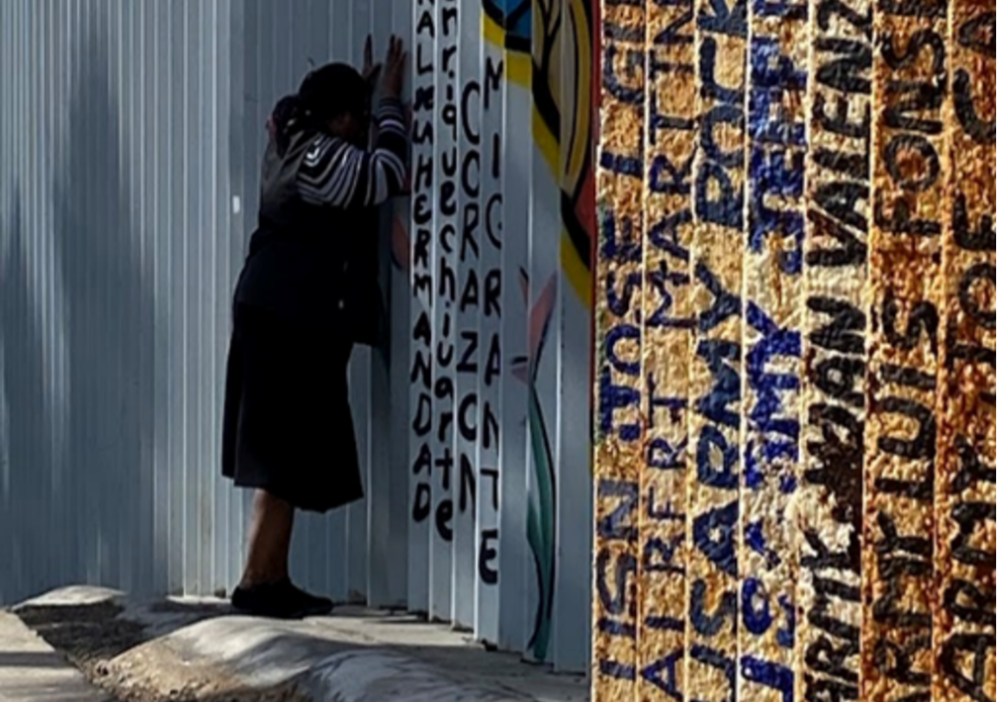
Sr. Florence Anyabuonwu participated in a pilgrimage along the U.S.-Mexico border with more than 20 sisters from five different congregations. Here she prays at the border wall. (Courtesy of Florence Anyabuonwu)
In 2007, I embarked on my journey to the United States as an international student, brimming with aspirations of academic excellence and career advancement. Like countless others, I was captivated by the promise of opportunity that this country held — a promise that, in many respects, I later discovered to be elusive for a while. Despite my best efforts, my transition from being a student to a professional proved to be a daunting challenge as I grappled with the harsh realities of a system that seemed designed to keep me and millions like me on the margins.
Consequently, after graduating from college, I found myself thrust into a world of uncertainty. This is because, despite my academic achievements, my lack of legal documentation barred me from realizing my dreams. Aspirations to continue with religious life seemed impossible and the job offers I had hoped would come my way evaporated with each new rejection I received. As a result, my once bright horizon of possibility grew dimmer with each passing day for a long time. This is because in the eyes of the law, I was an outsider — an undocumented immigrant whose only crime was the audacity to dream.
As I grappled with the harsh realities of life on the margins, I was forced to confront the contradictions inherent in America's immigration system. On the one hand, I was welcomed with open arms as a student and was encouraged to pursue my dreams and ambitions. Yet, as soon as I graduated, I found myself cast adrift in a sea of uncertainty, relegated to the shadows of society by virtue of my race and legal status. It was a pill too bitter to swallow, which again is a stark reminder of the arbitrary nature of borders and the power dynamics that shape our world.
However, the quote by Bob Marley, "You never know how strong you are until being strong is your only choice," deeply resonates with me as I reflect on my journey through adversity. What struck me the most was realizing that I was not navigating this journey alone. I firmly believe what the Lord said in Matthew 28:20: "And surely I am with you always, to the very end of the age." In my own life, it proved true all the way: God indeed came through for me.
My journey across our country exposed me to countless individuals grappling with similar challenges — each striving for recognition, dignity and the chance to pursue their dreams. This shared bond of solidarity stirred something deep within me, compelling me to turn my own struggles into meaningful action.
From 2012 to 2016, I delved into advocacy work with a fervent determination to address the systemic injustices that have marginalized and disheartened so many. While I understood the enormity of reforming the immigration system, I firmly believed that every effort counts in assisting the migrants we encounter. Thus, I applied to join the resettlement program in Cincinnati, Ohio. As a staff member of the resettlement program at Catholic Charities of Southwestern Ohio, I worked hard to assist refugees and asylees in navigating the daunting challenges they faced. Through these endeavors, I found a profound sense of purpose.
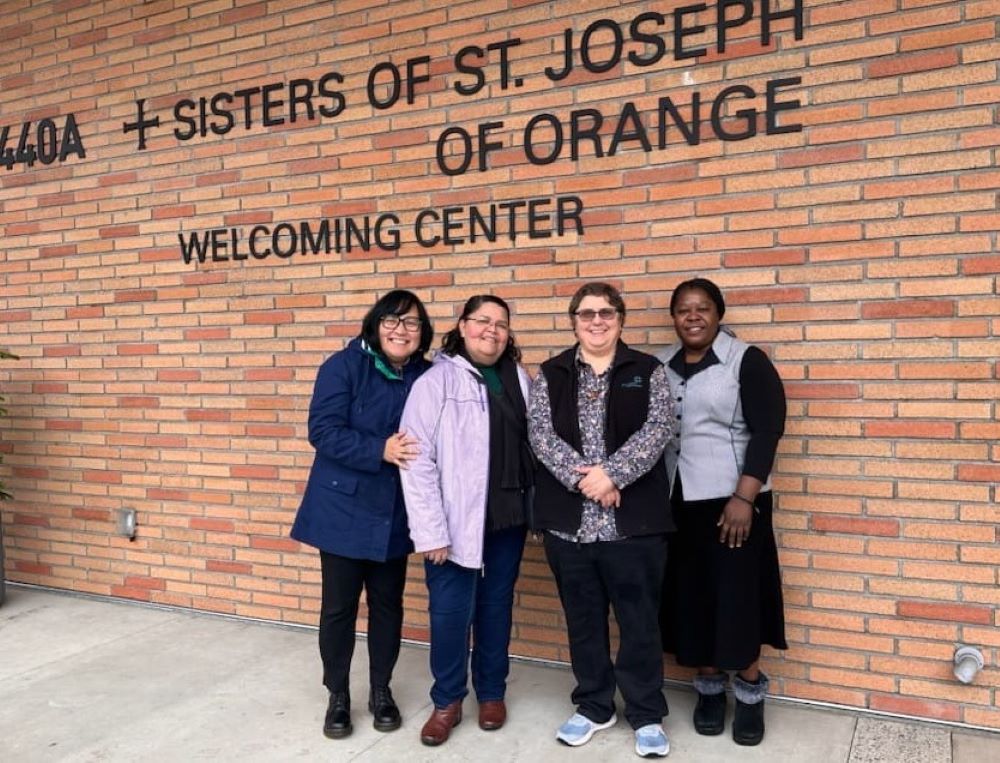
Sr. Florence Anyabuonwu, far right, participated in a Feb. 5-9 border pilgrimage. She is pictured with other Sisters of St. Joseph of Orange, California, who participated in the border pilgrimage. (Courtesy of Florence Anyabuonwu)
Recognizing the importance of being professionally prepared for my desired role, I decided to return to school, eager to find a career path that would help me to utilize my skills and compassion to empower marginalized communities. After thoughtful reflection, I came to the realization that social work aligned perfectly with my aspirations. Driven by this conviction, I pursued a master's degree in the field, eager to make a meaningful difference in the lives of others. Since then, my dedication to assisting people, particularly those facing intricate life challenges, has remained unchanged.
Due to my personal migration experience and professional training as a social worker, I felt compelled to accept the invitation to go on a transformative five-day U.S.-Mexico border pilgrimage. Accompanied by a diverse group of more than 20 Catholic nuns from five different congregations, as well as a Franciscan friar and a priest from the Diocese of Seattle, we set out on our journey Feb. 5-9. Little did I know this pilgrimage would thrust me into a whirlwind of emotions, experiences and reflections that reminded me of what I had experienced, except what I witnessed was way more than what I went through as a migrant.
Our pilgrimage began with a sense of anticipation intermingled with fear. We understood that we were embarking on more than just a physical journey; it was to be a profound transformation of heart and soul. As we traveled along the border, going from the busy streets of Tijuana to the peaceful towns of Calexico and Mexicali, we encountered a variety of shelters and programs, each showing us a distinct aspect of the migrant experience.
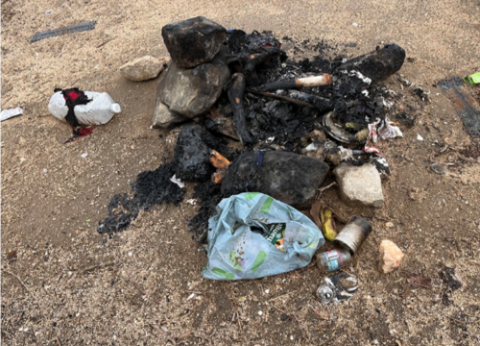
The fireplace at a migrant camp in Southern California border community of Jacumba (Courtesy of Florence Anyabuonwu)
One of our initial stops was Our Lady of Guadalupe, a Jesuit-operated parish providing transitional housing for Spanish-speaking men. Here, we learned of the harrowing experiences of migrants. They shared tales of trekking for days, weeks, or even months, enduring perilous waters and inhospitable conditions to reach the border. Upon arrival, they often found themselves stuck in limbo for weeks to months, navigating the application process, attending hearings and awaiting their fate — a place of uncertainty. It served as a reminder of the immense sacrifices they made looking for safety and opportunity.
At the Cabrini Center, we were confronted with the heartbreaking reality of women and children fleeing violence and persecution. Here, they found not only shelter but also much-needed counseling services to help them heal from the trauma of their past experiences. The resilience of these individuals deeply touched our hearts.
Our next stop was at the Calexico United Methodist Church, where we had the privilege of meeting their leader. The young enthusiastic pastor graciously shared with us how his congregation had embraced the call to aid migrants in need, providing overnight stays in hotels and transportation as well as extending a range of support services. They lived the spirit of compassion and solidarity that our world so deeply craves today.
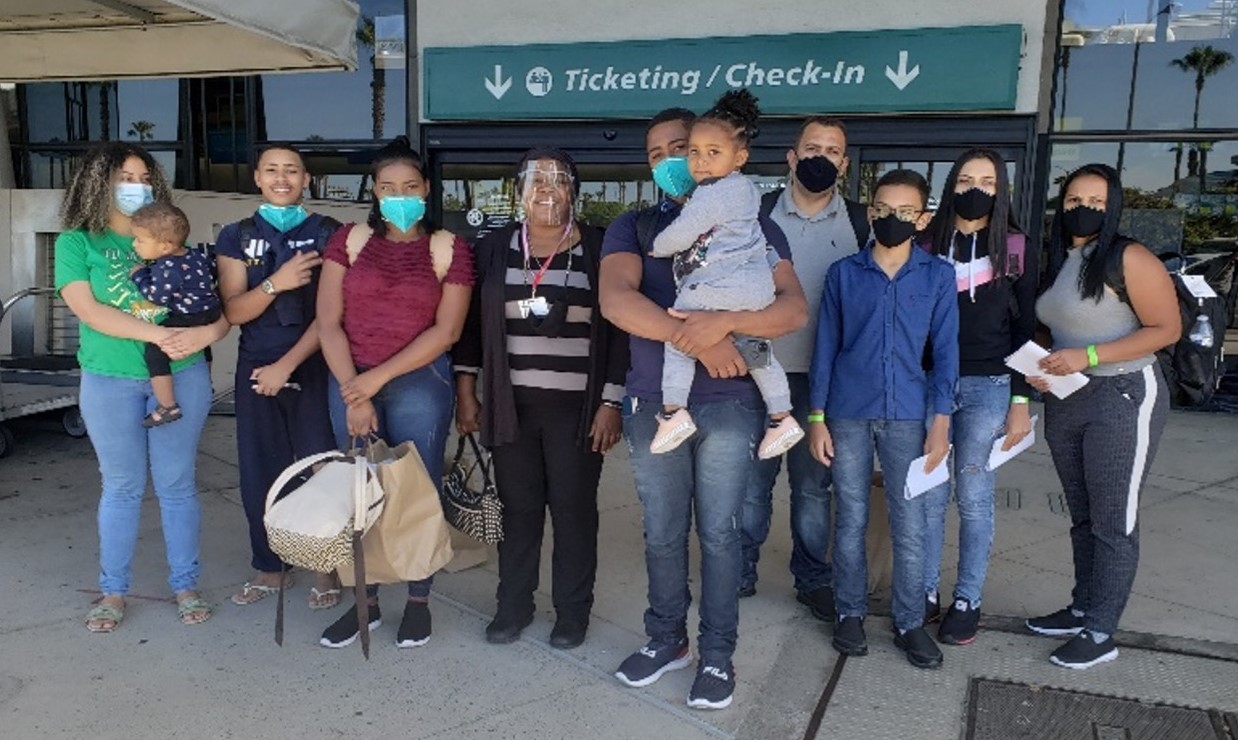
Sr. Florence Anyabuonwu. who participated in the Feb, 5-9 border pilgrimage, is shown with a group of refugees she worked with during COVID-19. (Courtesy of Florence Anyabuonwu)
Perhaps one of the most profound experiences of our pilgrimage was our visit to Casa de los Pobres, a shelter and clinic founded by Franciscan Sisters in 1957. Here, migrants received free medical care and support. As we witnessed the dedication of the staff and volunteers, we were reminded of the power of community and the importance of standing together in times of need.
Our journey also led us to both the Jacumba north and east camps, where the sight of makeshift shelters spoke volumes. Seeing the traces of dangerous journeys struck a chord deep within me, reminding me of the biblical narrative of Mary and Joseph seeking refuge. Like the Holy Family, the migrants we encountered were vulnerable, searching for a safe place amidst a hostile environment. However, unlike the Holy Family, who could eventually return to the safety and comfort of their home, these migrants faced an uncertain future. For them, the harsh wilderness, with its cold and fiery winds, was their temporary home, representing the many difficulties that awaited them in this "land of the free." Until, if ever, they succeeded in obtaining the documents needed to secure their legal status, they would remain trapped in a limbo of uncertainty and vulnerability.
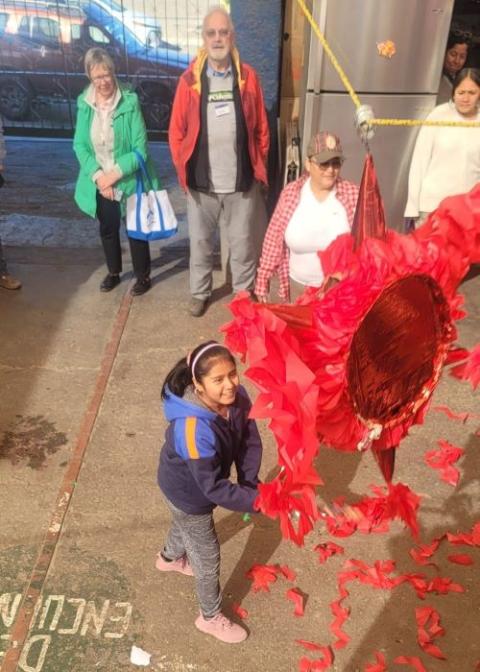
A child breaks a piñata at a shelter in Mexicali, Mexico. (Courtesy of Florence Anyabuonwu)
One memory from our pilgrimage remains vividly etched in my mind. It was the moment we witnessed children laughing joyfully while hitting a piñata at a Mexicali shelter. Their laughter, innocence and resilience stood in stark contrast to the challenges they face. For a fleeting moment, as they picked their candies, selected donated items, and toys and Valentine's Day boxes we prepared for them, life seemed to hold a semblance of normalcy.
Spending time with these children, hearing their happy chatter, seeing the smiles on their faces, feeling their warm hugs, and witnessing their ability to find joy stirred a mix of emotion within me —joy and sadness. It was clear that despite their struggles (like missing school for so long), they were incredibly resilient.
However, beyond the moments of joy we shared with them, I couldn't ignore the reality of their situation. Some of these children and their families will continue to exist in a state of perpetual limbo, their lives suspended as they await resolution to their immigration cases. Apart from occasional visitors like us, their interactions with the outside world are severely limited. They are confined to the walls of the shelters where they wait anxiously for their cases to be heard and approved.
Jesus tells us in Matthew 19:14: "Let the little children come to me, and do not hinder them, for the kingdom of heaven belongs to such as these." His invitation emphasizes the urgent need for systemic change to ensure every child has the opportunity to thrive, regardless of their immigration status or circumstances.
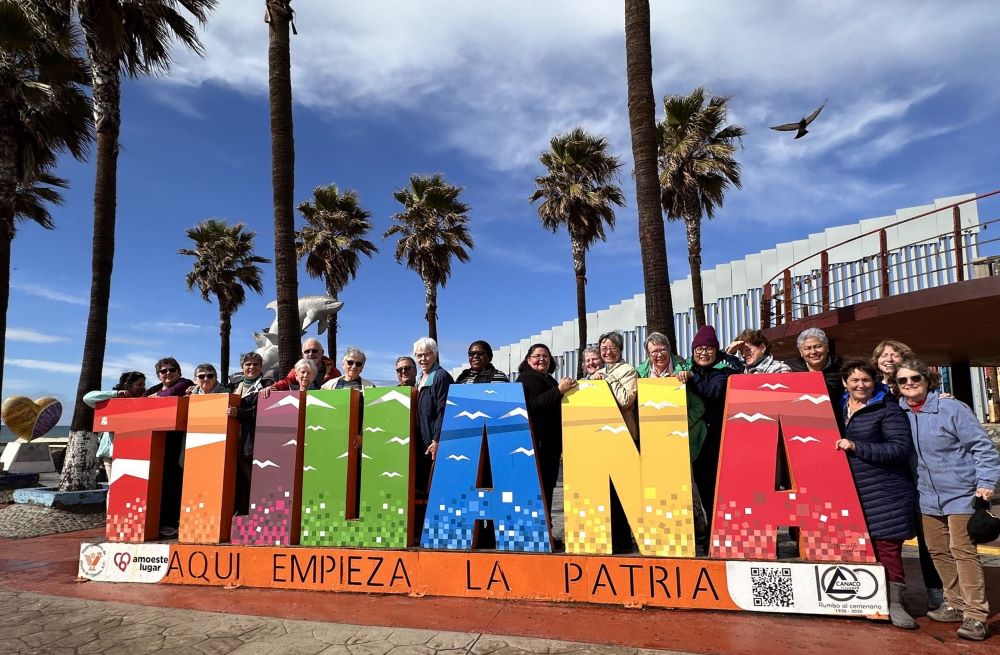
More than 20 Catholic nuns from five different congregations, as well as a Franciscan friar and a priest from the Diocese of Seattle, participated in the Feb. 5-9 border pilgrimage. "Our pilgrimage began with a sense of anticipation intermingled with fear," wrote Sr. Florence Anyabuonwu. (Courtesy of Florence Anyabuonwu)
Our journey concluded with a prayer service at Parks View Cemetery, where we reverently paid our respects to migrants who tragically lost their lives on their journey to the U.S. Their unmarked graves serve as yet another reminder of the injustices migrants face, even in death. The cemetery, walled off, with only stones marking the bodies, offers a somber testament to their plight. Some remain nameless, their identities lost to the passage of time and neglect. A sign reading "do not trespass" further denied them the comfort of visitors, preventing even the placement of flowers.
This grim reality stands in stark contrast to another nearby cemetery, adorned with gravestones, clear markings, and flowers — a vivid example of the disparities migrants face, even in their final resting place. Yet, amidst this sorrow, there is also hope — a powerful reminder that through acts of solidarity and compassion, we have the power to build a more just and equitable world for everyone.
Advertisement
Throughout this border pilgrimage the migrants shared stories of separation, loss, and trauma in every shelter we visited. The pain of families torn apart and the uncertainty surrounding their loved ones' fates weighed heavily on my heart, reminding me of our shared humanity.
Gazing at the imposing wall dividing and dehumanizing, I am struck by the magnitude of suffering it represents. However, I also recall the reassuring words of Archbishop Oscar Romero: "We plant the seeds that one day will grow. We water seeds already planted, knowing that they hold future promise." As we journeyed, these words reminded me that our experiences, like planted seeds, have the potential to grow and bring forth positive change.
This pilgrimage left an indelible imprint on my heart, reshaping my perspective and igniting within me a fervent desire to do more. I am filled with a renewed sense of purpose—a commitment to stand in solidarity with the migrant community, to speak truth to power, and to strive for a world where all are welcomed, valued, and cherished. I want to work for a world where compassion triumphs over cruelty. This pilgrimage was only the beginning, yet in bearing witness to the plight of migrants, we not only honor their humanity but reaffirm our own and sow the seeds of a brighter future.







